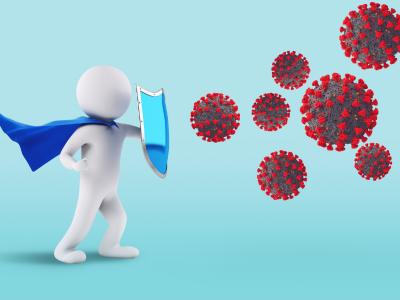Acupuncture has gained popularity recently for its benefits in improving immune system function. This holistic approach involves the insertion of thin needles into specific points on the body to stimulate energy flow and restore balance. While acupuncture is commonly known for its effectiveness in pain management, it also offers numerous advantages for boosting the immune system.
One of the primary benefits of acupuncture is its ability to reduce stress levels. Stress has a significant impact on the immune system, weakening its response to pathogens and increasing the risk of illness. Acupuncture helps to regulate the body's stress response by promoting the release of endorphins, which are natural painkillers and mood enhancers. This, in turn, reduces stress and anxiety, allowing the immune system to function optimally!
Furthermore, acupuncture has been found to enhance the production of immune cells, such as natural killer cells, which play a crucial role in defending the body against viruses and cancer cells. A study published in the Journal of Traditional Chinese Medicine found that acupuncture increased the activity of natural killer cells, suggesting its potential to improve immune system function.

In addition to boosting immune cell production, acupuncture also improves circulation. The flow of blood and lymphatic fluid is essential for the proper functioning of the immune system, as it helps transport immune cells and nutrients throughout the body. By stimulating specific acupuncture points, blood circulation is enhanced, allowing immune cells to reach their destinations more efficiently.
Moreover, acupuncture has been shown to regulate inflammation, a key factor in immune system function. Chronic inflammation can impair immune responses and lead to various health conditions. Research published in the Journal of Neuroimmunology demonstrated that acupuncture can modulate the production of inflammatory cytokines, reducing inflammation and promoting a balanced immune response.

In addition to the benefits above, acupuncture has been known to also assist with other things that may contribute to improved immune function:
Balancing Energy Flow (Qi): According to traditional Chinese medicine theory, acupuncture helps balance the flow of vital energy, or "Qi," through the body's meridians. When Qi flows smoothly, it is believed to support overall health, including immune function.
Stimulating Lymphatic Flow: The lymphatic system plays a crucial role in the immune response by filtering out toxins and waste products. Acupuncture may help stimulate lymphatic flow, aiding in the removal of these substances.
Improving Sleep Quality: Quality sleep is essential for a healthy immune system. Acupuncture may help improve sleep patterns and address conditions like insomnia or sleep disturbances that can weaken the immune system.
Supporting Organ Function: Acupuncture is believed to influence the function of specific organs, which can indirectly impact immune health. For example, the spleen is considered important for immune function in traditional Chinese medicine, and acupuncture may be used to support its function.
It is important to note that acupuncture should not be considered a standalone treatment for immune system disorders or diseases. It is most effective as a complementary therapy alongside conventional medical treatments. Consulting with a qualified acupuncturist and healthcare professional is crucial to ensure a comprehensive and personalized approach to immune system support while supporting your specific needs and goals.
Book an appointment HERE with one of our highly qualified Acupuncturists today!
References:
1. National Library of Medicine: Acupuncture and Immunity
Fall time brings many new changes. Changes in the weather, outdoor activities, school, and even the holidays are rapidly approaching. While all this change can be exciting and inspiring, we need to think about “changing” our health habits as fall time nears.
The amount of sunlight that we enjoyed during the warmer months, is now diminishing as fall time approaches. School time means more homework and studying, and holidays may mean more travel and/or cooking for family gatherings. All of these can add stressors to our life without us being completely aware of it. We go through our day not taking notice of the wonderful changes around us because we are so overwhelmed. Below are some healthy tips that you can add to your daily routine to help keep your mind and body functioning at its best.
Vitamin D – an essential vitamin we get from the sun, is responsible for immune health, strong bones, fighting off depression, energy and overall wellbeing. In the warmer months we typically can produce a more than adequate amount of this vitamin by getting the proper amount of daily sunshine. But as the colder months come around, and the less sun we have on our bodies, the less we’re able to produce on our own. Taking a vitamin D supplement in the fall through winter will ensure you have enough to keep your body healthy and functioning at its best.
Daily Mini Meditation – With all the busyness of life we often get overwhelmed very quickly. Too many texts, emails and appointments can send us spiraling down an overloaded path. We know we need to slow down or back off, but how? By carving out 5 minutes for a mini meditation, you can totally change the course of your day. Use this time to quiet the noise and bring yourself back to center letting go of all the stress and negativity you are holding inside. Mini meditations are perfect for calming a chaotic day (or moment), so we can get back to focusing on our tasks without the stress and added weight on our shoulders.
Walking – An often-overlooked easy workout and de-stressor, is useful in managing weight, balancing blood glucose and relieving stress. Walking for 10 minutes after a meal will help lower blood glucose levels and reduce bloat. It can also boost your mental health and help you sleep better. Use this time to practice some meditation as well and double up on the health boost!
Be mindful that you don’t overeat and then try to walk too fast. Always allow your food to settle some and keep the walking at a leisure pace so no unpleasant side effects occur.
Mindfulness – The practice of mindfulness is one that is most overlooked. If you drive to work daily, how much do you notice on your way there? Once you get into work, do you go through the motions of turning on your computer or getting out the cash drawer for your register? How much do you pay attention to while doing these tasks? Mindfulness is the idea that we closely pay attention to several different things throughout our day. Next time you drive to work, look at the things you drive past. Did you notice your neighbors had planted a new tree or shrub? Or maybe that the billboard was updated on the expressway. What about your workplace? Did you notice anything new there, or perhaps something that you just never noticed before?
As Langer points out in her report The Construct of Mindfulness, if we continue to ‘clock out’ psychologically, doing the same things over and over, without ever noticing new things, we are at risk of dangerous outcomes. It is so very important to bring new sights into an already known world, or we risk making mistakes by simply doing them too often and getting too lax in our routine. How many times have you said, “I’ve done that so much, I can do it with my eyes closed”? What if you get so used to doing it, you just zone out and really don’t remember doing it at all? Take the time to notice three new things in your environment each day. Bring new into an already known environment and see how things change for you.
Bedtime – How late do you stay up before going to bed? Did you know that getting less sleep than you need can lead to heart disease, weight gain, worsened immune system and less mental clarity? While we sleep, our body does it’s repairing. If we get less than optimal sleep, we risk running into some major health issues. Setting a bedtime is the first step in a good bedtime routine.
To ensure you don’t stay awake too long before dozing off, turn off all devices at least 2 hours before bedtime. Avoid caffeine past 4pm (or sooner if you have an early bedtime) and try taking a hot bath or drinking some hot tea to relax.
So, as we transition over these next few months into fall, try integrating these 5 healthy habits into your daily routine to help your body stay at its best.